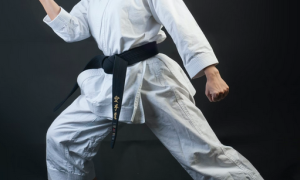Taekwondo is guided by a set of five fundamental core values that shape its practitioners’ character and conduct. The 5 Tenets of Taekwondo serve as pillars of moral and ethical principles.
![]()
What are the 5 Tenets of Taekwondo?
Courtesy
Courtesy, also known as “Ye Ui” in Korean (예의), embodies respect, politeness, and humility. It fosters a harmonious environment, promoting discipline and personal growth. Upheld inside and outside the dojang, practitioners are expected to demonstrate etiquette, sportsmanship, and a commitment to embracing Taekwondo’s moral and ethical values.
Integrity
Integrity, also known as “Yom Chi” in Korean (염치), means discerning right from wrong and standing up for what’s ethical. It involves honesty, strong moral principles, and being beyond reproach. Practitioners embrace integrity to uphold good character, decency, and ethical behavior in every aspect of their journey.
Perseverance
Perseverance, known as “In Nae” in Korean (인내), is the unyielding determination to overcome challenges and pursue goals. It exhibits the willingness to persist through difficulties, setbacks, and self-doubt. Practitioners of Taekwondo demonstrate perseverance by pushing their limits, staying committed to training, and embracing the mindset of continuous improvement, both in martial arts and in life.
Self-control
Self-control, known as “Guk Gi” in Korean (극기), entails having mastery over one’s thoughts, actions, and emotions. It involves maintaining a pure mind and body, exercising restraint in challenging situations. Practitioners exemplify self-control both in training and daily life, demonstrating discipline, patience, and the ability to manage conflicts peacefully.
Indomitable spirit
Indomitable spirit, known as “Baekjul Boolgool” in Korean (백절불굴 ), embodies the unwavering courage to persist even in the face of seemingly insurmountable adversity. It is the resolute refusal to back down or give up, maintaining strength of spirit when confronted with overwhelming challenges. Practitioners with indomitable spirit exhibit determination, pushing beyond perceived limits and inspiring others by their fearless pursuit of success.
![]()
How Students Exhibit the Tenets of Taekwondo
Here are just some of the ways Taekwondo students live by the 5 tenets.
Courtesy (예의):
- Demonstrating respect:
- Bowing to instructors, seniors, and fellow practitioners as a sign of respect.
- Using appropriate titles and language when addressing others in the dojang.
- Showing appreciation and gratitude towards instructors for their guidance.
- Embracing sportsmanship:
- Congratulating opponents, win or lose, after sparring or competition.
- Encouraging and supporting fellow practitioners to achieve their best.
- Respecting and following the rules and regulations of Taekwondo tournaments.
- Upholding etiquette:
- Maintaining cleanliness and tidiness in the training environment.
- Waiting patiently and quietly when instructors are giving instructions.
- Assisting new or younger practitioners in learning and understanding the practices and protocols of Taekwondo.
![]()
Integrity (염치):
- Being honest and truthful:
- Admitting mistakes and taking responsibility for one’s actions.
- Refusing to engage in dishonest practices, such as cheating or deception.
- Representing oneself and the art of Taekwondo with integrity and authenticity.
- Standing up for what’s right:
- Speaking out against unfairness or injustice within the Taekwondo community.
- Respecting and adhering to the moral and ethical principles of Taekwondo.
- Acting as a role model by displaying good character and integrity in daily life.
- Being trustworthy:
- Keeping promises and commitments made to instructors, peers, and oneself.
- Maintaining confidentiality and respecting the privacy of others.
- Building a reputation as a reliable and dependable individual within the Taekwondo community.
![]()
Perseverance (인내):
- Overcoming challenges:
- Pushing through physical and mental barriers during intense training sessions.
- Setting and working towards long-term goals, such as achieving higher belt ranks.
- Embracing failure as an opportunity to learn and grow, rather than giving up.
- Consistency and dedication:
- Attending regular training sessions and actively engaging in drills and exercises.
- Maintaining a disciplined practice routine, even when faced with obstacles or distractions.
- Continuously seeking improvement through focused effort and dedication.
- Developing a growth mindset:
- Viewing setbacks as stepping stones to success and embracing a positive attitude.
- Seeking feedback from instructors and using it constructively to refine techniques.
- Inspiring others through personal growth and the perseverance displayed in training.
![]()
Self-control (극기):
- Managing emotions:
- Maintaining a calm and composed demeanor, even in challenging situations.
- Controlling anger, frustration, or impatience during sparring or competitive scenarios.
- Using Taekwondo techniques responsibly and only when necessary.
- Cultivating discipline:
- Following training instructions promptly and without question.
- Adhering to the principles and values of Taekwondo in daily life choices.
- Practicing self-restraint in areas such as diet, lifestyle, and overall behavior.
- Demonstrating self-discipline:
- Avoiding engaging in confrontations or conflicts outside the dojang.
- Refraining from using Taekwondo skills for personal gain or to cause harm.
- Developing a strong work ethic and consistently striving for excellence.
![]()
Indomitable spirit (백절불굴):
- Showing resilience:
- Bouncing back from setbacks, injuries, or defeats with determination and perseverance.
- Remaining motivated and focused on goals, even in the face of adversity.
- Inspiring others through unwavering commitment and never giving up.
- Embracing challenges:
- Seeking opportunities to step outside of comfort zones and take on new and difficult tasks.
- Approaching obstacles as opportunities for personal growth and self-improvement.
- Encouraging fellow practitioners to face challenges head-on and overcome them.
- Displaying courage:
- Taking risks in training, such as attempting more advanced techniques or participating in competitions.
- Speaking up for oneself or others when necessary, regardless of potential consequences.
- Standing up against bullying or discrimination, promoting a safe and constructive environment.
![]()
Tenets Of Taekwondo – FAQ
What Is the Taekwondo Student Oath?
The Taekwondo oath is a pledge that practitioners recite to reaffirm their commitment to the principles and values of Taekwondo. While there may be slight variations, the oath generally encompasses the following elements:
- I shall observe the tenets of Taekwondo.
- I shall respect my instructors and seniors.
- I shall never misuse Taekwondo.
- I shall be a champion of freedom and justice.
- I shall build a more peaceful world.
Why is the Taekwondo Student Oath important?
The Taekwondo student oath serves as a reminder to students of their responsibilities to the art, their instructors, fellow students, and society. It is recited before classes after the bow-in process, which involves showing respect to the flags, head instructor, and other instructors. The oath is accompanied by the recitation of the tenets of Taekwondo, reinforcing the core principles that practitioners should uphold.



